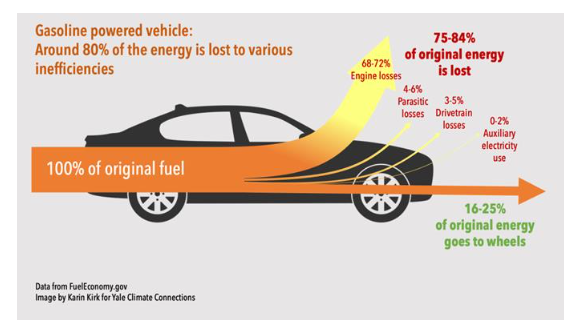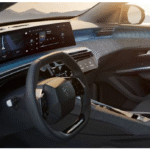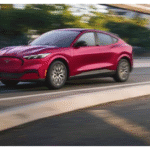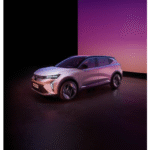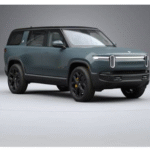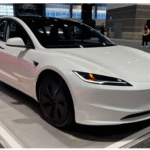Electric cars are here. They’re cleaner. They’re quieter. But are they truly more energy-efficient than petrol cars?
In this blog, we’ll explore that big question. We’ll keep things simple. No jargon. Just facts and real comparisons.
Let’s hit the road!
What Is Energy Efficiency in Cars?
Energy efficiency in cars means how much of the energy in fuel or electricity actually moves the car. It’s about how little is wasted.
Here’s a basic breakdown:
- Petrol cars burn fuel.
- Electric vehicles (EVs) use electricity stored in batteries.
But not all energy becomes movement. Some is lost as heat or noise.
Think of it like this: You eat food (fuel). How much of that food becomes energy you use, and how much is lost?
That’s energy efficiency.
How Efficient Are Petrol Cars?
Petrol engines have been around for over 100 years. But they’re not very efficient.
Most petrol cars convert only about 20%–30% of fuel energy into motion. The rest? Lost to heat, sound, and engine friction.
Let’s visualize this:
Only 1 out of every 4 liters of petrol actually moves your car forward.

Energy loss in petrol engines
Source: https://yaleclimateconnections.org/2024/01/electric-vehicles-use-half-the-energy-of-gas-powered-vehicles/
Now imagine how much fuel that wastes over time.
How Efficient Are Electric Vehicles (EVs)?
Electric cars are super-efficient.
Electric vehicles convert about 85%–90% of their battery energy into movement. That’s more than 3x better than petrol cars.
Why?
- No combustion engine.
- Fewer moving parts.
- Almost no heat loss.
- Instant torque delivery.
In simple words: Electric vehicles waste less and use more of what they’re given.

EV drivetrain efficiency chart
Source: https://switchedon.reneweconomy.com.au/content/electric-vehicles-use-half-the-energy-of-fossil-fuel-vehicles
So, for every full battery charge, most of that power is used to drive. Not wasted.
The Tank-to-Wheel vs Well-to-Wheel Game
Now let’s dig deeper.
We compare cars in two ways:
- Tank-to-Wheel: From fuel or battery to the wheels.
- Well-to-Wheel: From fuel source (oil well or power plant) to the wheels.
Electric vehicles win both games. But the Well-to-Wheel view is the real deal.
Even when electricity comes from coal or gas, electric vehicles still use energy better than petrol cars.
Here’s why:
- Power plants are more efficient than car engines.
- Electric vehicles charge at night when grid demand is low.
- Renewable energy (like solar, wind) boosts electric vehicle efficiency.
In many countries, electric vehicles now run on cleaner, greener power.
Real-World Electric Vehicle vs Petrol Efficiency Comparison
Let’s compare two popular cars:
- Tesla Model 3 (Electric)
- Toyota Corolla (Petrol)

Verdict: The Tesla uses less energy, costs less to run, and pollutes less.
How About Charging Losses in Electric Vehicles?
Great question.
Some energy is lost while charging electric vehicles. On average, 10–15% of electricity is lost during charging and battery storage.
Still, that leaves you with 75–80% usable efficiency—much better than petrol.
Even with grid losses and battery limits, electric vehicles stay far ahead in energy use.
Cost Efficiency: Electricity vs Petrol
Let’s break down running costs.
- Petrol prices keep rising.
- Electricity (especially from solar) is cheaper.
For example:
- A petrol car might use 8L/100km, costing $12–$14.
- An electric vehicle might use 15 kWh/100km, costing $2–$4.
https://www.calculator.net/fuel-cost-calculator.html
Battery Efficiency and Regenerative Braking
Electric vehicles have another smart trick: regenerative braking.
Every time you brake, the car recovers energy and stores it back in the battery.
Petrol cars? They just lose that energy as heat.
So in stop-and-go traffic, electric vehicles are even more efficient.
Plus, modern electric vehicle batteries are improving fast:
- More energy density.
- Less charging time.
- Better recycling.
Are Electric Vehicles Always More Efficient?
Almost always—yes.
But if:
- You drive long distances without chargers.
- You live where electricity is dirty (coal-heavy).
- Or electricity costs more than petrol (rare case),
Then petrol cars might seem slightly better. But that’s fading fast as grids go green.
Even in coal-based areas, electric vehicles still emit less CO₂ over their lifetime.
Electric Vehicles and Climate Efficiency
Let’s talk environment.
Energy efficiency isn’t just money—it’s about clean air and climate too.
A petrol car emits:
- Carbon dioxide (CO₂)
- Nitrogen oxides (NOₓ)
- Particulate matter (PM2.5)
An electric vehicle emits none of that directly.
Even counting factory production and battery mining, electric vehicles come out ahead over time.
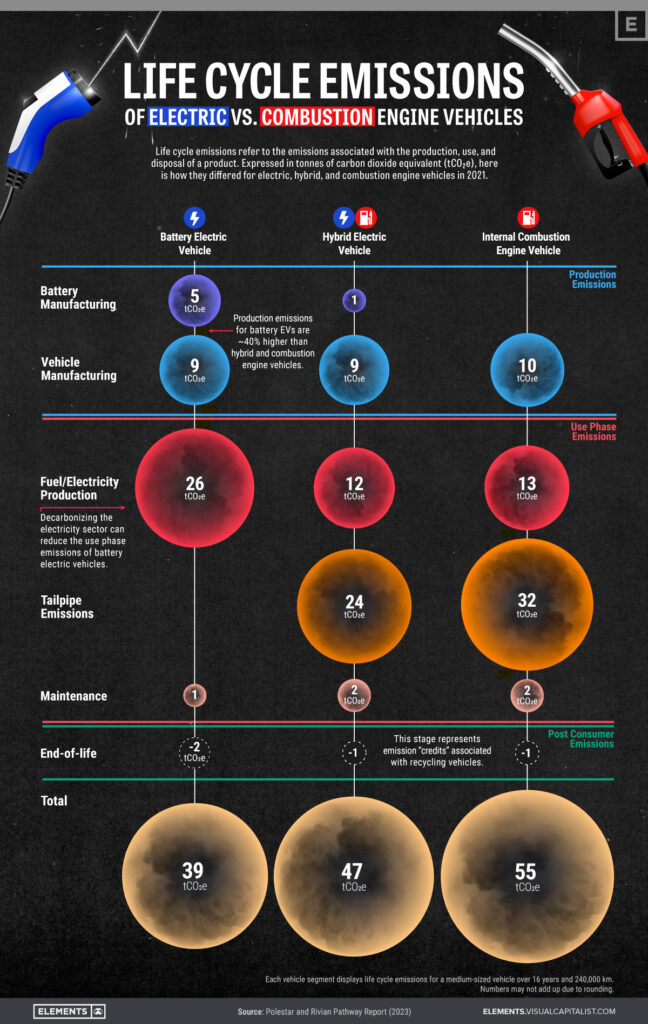
Electric vehicle lifecycle emissions graph
Source: https://www.visualcapitalist.com/life-cycle-emissions-evs-vs-combustion-engine-vehicles/
What About Hybrids?
Good thought.
Hybrids are a mix—petrol engine + small electric motor.
They’re more efficient than petrol cars, but not as efficient as full electric vehicles.
A hybrid might get 50 mpg. An Electric vehicle? Equivalent of 100–120 mpg.
So if energy savings matter, electric vehicles still win.
Long-Term Efficiency and Maintenance
Electric vehicles are not just energy-efficient on the road. They’re also efficient in the garage.
Less maintenance.
Why?
- No oil changes.
- No spark plugs.
- Fewer parts that wear out.
That’s time and money saved. And more uptime on the road.
The Verdict: Electric Vehicles Are Energy Champs
Let’s sum it all up:

Electric vehicles win on nearly every count.
When Is the Best Time to Switch to Electric Vehicle?
Now.
Why?
- Battery tech is mature.
- Electric vehicle charging stations are growing.
- Costs are coming down.
- Energy grids are cleaner.
- Governments offer electric vehicle incentives
Every kilometer you drive in an electric vehicle is a step toward cleaner roads, smarter energy use, and a healthier planet.
Final Words: Drive Smart, Drive Efficient
Petrol cars had their time. But the road ahead is electric.
Electric vehicles are not just cool. They’re the smartest choice when it comes to energy efficiency.
They use more of what they’re given. They save you money. They protect the planet.
That’s not just better driving. That’s future driving.

Petrol vs EV Energy Efficiency Diagram
Source: https://www.sustainabilitybynumbers.com/p/inefficiency-ice

EV Drivetrain Diagram
Source: https://www.researchgate.net/figure/Schematic-of-the-parallel-hybrid-electric-vehicle-drivetrain_fig1_224324625
